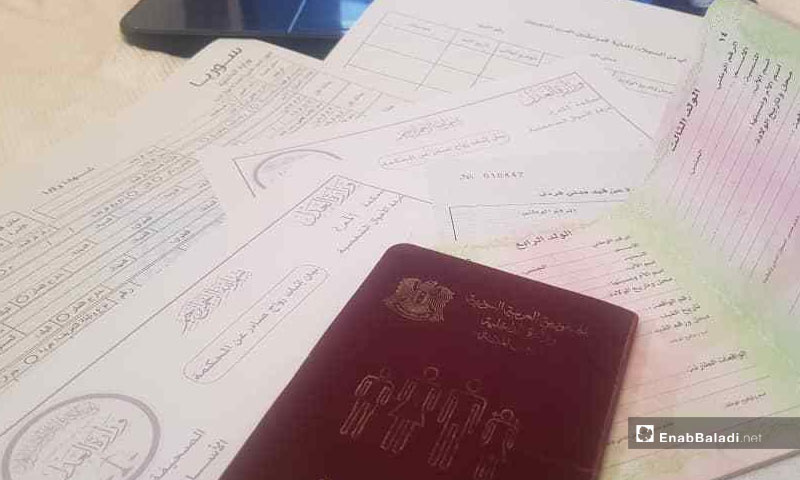Rima al-Jundi, 27, from Maaret al-Numan, was separated from the husband she married at the age of 19, and could not solemnize her marriage in court due to the absence of government departments.
Rima told Enab Baladi she got divorced because of her husband’s drug abuse. The young woman could not enjoy her rights and had to waive all of them in exchange for freedom, although the marriage was conducted by the sheikh and witnesses.
The problem of identity documents is one of the complex problems in northwestern Syria, the opposition-held area. Marriage solemnization is considered as one of the major obstacles, in addition to paternity solemnization, issues related to post-divorce family, and the difficulty of acquiring heritage, alimony, dowry and others, due to the absence of government centers and the succession of departments staff in northern Syria having different backgrounds.
Children having no IDs
Mona al-Raya, from Maar Tahroma town in the southern countryside of Idlib, has been married for seven years and her marriage has not been solemnized until today.
Mona is her husband’s second wife and has three daughters, none of whom has any ID papers. The only document proving her marriage is the Sharia contract in the presence of the sheikh and witnesses.
Mona’s eldest daughter should be in school today, but because of displacement and not being registered, she will be denied her right to education this year.
There are no official statistics revealing the number of citizens who do not have ID documents, or have not solemnized their marriage, in a region having a population of more than 3.8 million, according to the statistics issued by “Response Coordinators.”
In order to measure the prevalence of the phenomenon, Enab Baladi examined a sample in a specific area, the Camp “Hafsa” in the countryside of Maaret al-Numan. The Director of the Camp, Jomaa al-Aliwi, declared that the issue of registration of children at the Personal Status Department threatens their education, for some families have around four unregistered children.
He also explained that the families inside the camp having no identity papers are estimated at around 40%.
From Public announcement to solemnization
Some marriages are registered in Idlib thanks to the special courts located at each town or city. Forms of solemnization vary according to the circumstances governing marriage contracts in different areas of Idlib.
In an interview with Enab Baladi, Adel al-Ibrahim, a lawyer working for the Civil Registry and court in Maarat al-Numan, said that some of these contracts are registered at the courts located in several areas in Idlib.
He gave an example of the city of Maarat al-Numan and the surrounding areas, where many citizens rely on the court of Maarat al-Numan to solemnize their marriage.
Al-Ibrahim declared that some people only announce marriages in public and guarantee the rights through witnesses, because many people do not trust the local courts, or are ignorant and unaware of the consequences of not solemnizing marriage.
The number of solemnized marriages since the beginning of 2019 until early September amounted to 6114, according to the figures of the Ministry of Civil Affairs of the Salvation government, which has been running the region since early 2019.
How is the marriage contract solemnized in Idlib?
Talal Zouaib, the Deputy Minister of Interior for Civil Affairs at the Salvation Government, told Enab Baladi that the solemnization process requires both spouses to visit Civil Registry secretariats to obtain special individual registration, and then they are referred to the competent Sharia court to obtain a marriage contract or proof of marriage following the case.
According to Zouaib, the court will address the competent Civil Registry secretariat to register the marriage and get the couple a family card.
He added that in case the husband died or the couple divorced, the wife shall file a lawsuit to prove marriage, paternity, death or divorce to the relevant court.
According to attorney Adel al-Ibrahim, if the ID card is not available, the registration documents are taken to the court (civil status judge) and the contract is solemnized and documented under a certain number it will be kept in the courtroom. The husband acquires a copy of the contract duly authenticated to be registered at the Civil Registry.
In case one of the parties to the contract is absent (lost, arrested or killed…), the existing party shall submit a registration request for both parties to the Civil Registry Department. Then, he or she shall file a claim for the solemnization of marriage and descent. The case will be duly registered and the court asks the plaintiff to bring witnesses.
If the prosecution is valid, the court shall issue a decision stating that the marriage shall be duly registered at the civil register and that the children shall be too.
However, the documents extracted from the courts in the governorate of Idlib are not recognized by any state, or by institutions in regime-held areas; thus, limiting their recognition to northern Syria.

